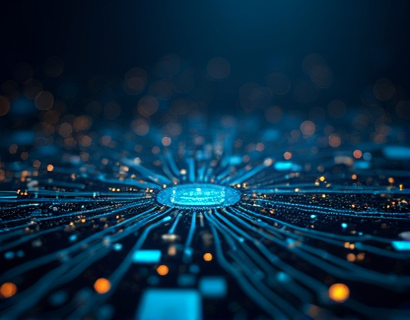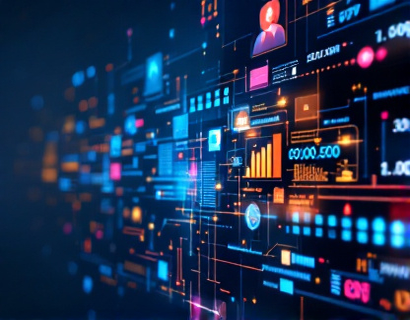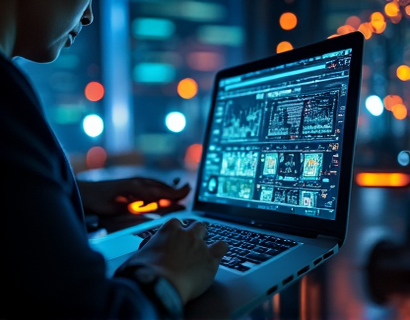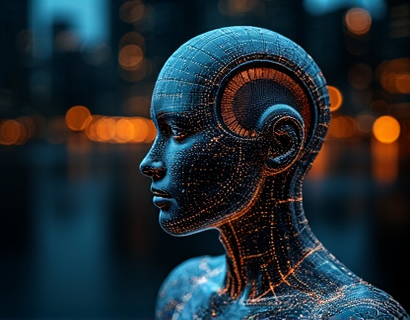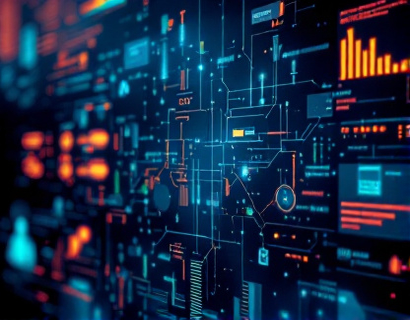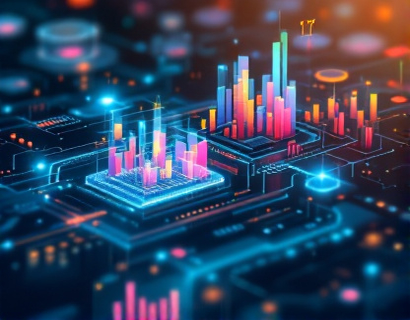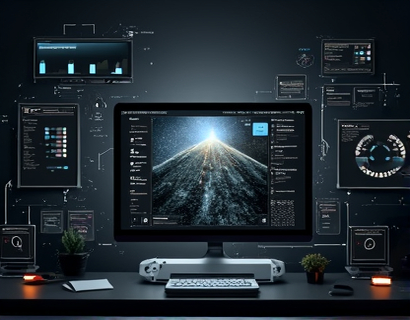Unlocking the Potential of Crypto and AI: A Guide to Advanced Digital Solutions for Enhanced Productivity
The intersection of cryptocurrency and artificial intelligence represents a revolutionary frontier in the digital world, offering unprecedented opportunities for tech-savvy professionals and early adopters to enhance their productivity and streamline their daily tasks. This article delves into the synergy between these two transformative technologies, exploring how they can be harnessed to create advanced digital solutions that redefine efficiency and innovation.
In the modern digital landscape, the demand for efficient and intelligent tools is higher than ever. Tech-savvy individuals and organizations are constantly seeking ways to optimize their workflows, reduce manual labor, and gain a competitive edge. The integration of cryptocurrency and AI provides a powerful toolkit for achieving these goals, enabling the development of decentralized, secure, and highly efficient systems.
Understanding Cryptocurrency and AI
Cryptocurrency, often referred to as digital or virtual currency, operates on blockchain technology, a decentralized ledger that ensures transparency, security, and immutability. Bitcoin, the first and most well-known cryptocurrency, paved the way for thousands of alternative coins and tokens, each with unique features and use cases. Beyond being a medium of exchange, cryptocurrencies serve as a medium for decentralized applications (dApps) and smart contracts, which automate and enforce agreements without intermediaries.
Artificial intelligence, on the other hand, encompasses a range of technologies that enable machines to perform tasks that traditionally required human intelligence, such as learning, reasoning, and problem-solving. AI algorithms can process vast amounts of data, identify patterns, and make predictions, significantly enhancing decision-making processes. The combination of blockchain's transparency and AI's computational power creates a synergistic effect that can drive significant advancements in various industries.
Enhancing Productivity with Crypto and AI
The convergence of cryptocurrency and AI can lead to the development of advanced digital solutions that streamline tasks and boost productivity. One of the primary ways this synergy manifests is through the creation of decentralized platforms that leverage AI for automated and optimized operations.
For instance, decentralized finance (DeFi) platforms utilize AI to provide automated trading, risk management, and portfolio optimization. These platforms eliminate the need for intermediaries, reducing transaction costs and increasing the speed of financial operations. AI algorithms can analyze market data in real-time, making informed decisions that traditional systems cannot match.
Another area where crypto and AI intersect is in the realm of supply chain management. By integrating blockchain for transparent and secure tracking of goods, AI can optimize logistics and inventory management. Predictive analytics powered by AI can forecast demand, reduce waste, and ensure efficient resource allocation. This not only enhances operational efficiency but also builds trust and transparency among supply chain participants.
Smart Contracts and Automated Workflows
Smart contracts, self-executing contracts with the terms directly written into code, are a cornerstone of blockchain technology. When combined with AI, smart contracts can become even more powerful, automating complex workflows and ensuring compliance with predefined conditions.
For example, in the real estate sector, smart contracts can facilitate property transactions by automatically verifying and executing the terms of a sale once all conditions are met. AI can enhance this process by analyzing property data, assessing market trends, and providing insights to both buyers and sellers. This reduces the need for manual paperwork and speeds up the transaction process, making it more efficient and secure.
In the context of project management, AI-driven tools can integrate with blockchain-based platforms to automate task assignments, monitor progress, and ensure accountability. AI can predict potential bottlenecks and suggest optimizations, while blockchain ensures that all actions are recorded and verifiable, fostering trust among team members.
Enhancing Security and Privacy
Security and privacy are paramount in the digital age, and the combination of cryptocurrency and AI offers robust solutions to address these concerns. Blockchain's inherent security features, such as cryptographic hashing and decentralized consensus mechanisms, provide a strong foundation for protecting data.
AI can further enhance security by detecting and mitigating threats in real-time. Machine learning algorithms can analyze patterns and identify anomalies that may indicate a security breach. For instance, AI-powered systems can monitor blockchain transactions for suspicious activity, alerting users and administrators to potential risks. This proactive approach to security ensures that sensitive information remains protected.
Privacy is another critical aspect where crypto and AI converge. Blockchain's pseudonymous nature, combined with AI-driven privacy tools, can help users maintain control over their personal data. Zero-knowledge proofs, an AI technique, allow users to prove the validity of a statement without revealing the underlying information. This ensures that sensitive data remains confidential while still enabling verification and compliance with regulations.
Optimizing Resource Allocation
Resource allocation is a key challenge in many industries, and the integration of cryptocurrency and AI can lead to more efficient and sustainable solutions. By leveraging blockchain for transparent tracking and AI for predictive analytics, organizations can optimize the use of resources such as energy, materials, and labor.
In the energy sector, blockchain can facilitate peer-to-peer energy trading, allowing consumers to buy and sell excess renewable energy directly. AI can optimize the distribution of energy resources, ensuring that supply meets demand efficiently. This not only reduces waste but also promotes the adoption of renewable energy sources, contributing to a more sustainable future.
In manufacturing, AI can predict maintenance needs and optimize production schedules, reducing downtime and resource wastage. Blockchain can ensure that all transactions and processes are recorded and verifiable, enhancing transparency and accountability. This combination leads to more efficient operations and cost savings.
Case Studies and Real-World Applications
Several real-world applications demonstrate the potential of combining cryptocurrency and AI to enhance productivity. One notable example is the use of AI in the insurance industry, where blockchain ensures transparent and secure data management, while AI algorithms streamline claims processing.
Insurance companies can use blockchain to store and share policy documents and claims data in a secure and immutable manner. AI can analyze this data to assess risk and process claims automatically, reducing the time and cost associated with traditional manual processes. This not only improves customer satisfaction but also enhances the overall efficiency of the insurance operation.
In the healthcare sector, the integration of blockchain and AI can revolutionize patient data management and medical research. Blockchain can provide a secure and decentralized platform for storing and sharing patient data, ensuring privacy and compliance with regulations. AI can analyze this data to identify patterns, predict disease outbreaks, and personalize treatment plans. This leads to better patient outcomes and more efficient healthcare delivery.
Challenges and Considerations
While the potential of combining cryptocurrency and AI is vast, there are several challenges and considerations that must be addressed. One of the primary challenges is the regulatory landscape, as both cryptocurrencies and AI are subject to varying regulations across different jurisdictions. Ensuring compliance and navigating the legal complexities is crucial for the successful implementation of these technologies.
Another challenge is the technical expertise required to develop and maintain blockchain and AI systems. Organizations need to invest in skilled professionals who can bridge the gap between these technologies and create seamless integrations. Additionally, the scalability and interoperability of these systems are important factors to consider, as they impact the overall effectiveness and adoption of the solutions.
Ethical considerations also play a significant role. The use of AI in decision-making processes must be transparent and fair, avoiding biases that can lead to unfair outcomes. Ensuring that AI algorithms are auditable and explainable is essential for building trust and maintaining ethical standards.
Future Trends and Opportunities
The future of cryptocurrency and AI is bright, with numerous trends and opportunities on the horizon. As technology continues to evolve, we can expect to see more innovative applications that further enhance productivity and efficiency.
One emerging trend is the development of decentralized autonomous organizations (DAOs), which combine blockchain and AI to create self-governing entities. DAOs can leverage AI for decision-making, resource allocation, and conflict resolution, operating with minimal human intervention. This model has the potential to transform various sectors, from finance to governance.
Another area of growth is the integration of AI with other blockchain-based technologies, such as the Internet of Things (IoT). Smart contracts can automate interactions between IoT devices, creating a more interconnected and efficient ecosystem. For example, in smart cities, AI can optimize traffic flow, energy consumption, and waste management, while blockchain ensures secure and transparent data sharing among various stakeholders.
Furthermore, the rise of Web3, a decentralized internet powered by blockchain, AI, and other emerging technologies, promises a more user-centric and secure online experience. Web3 applications will leverage AI to provide personalized and intuitive interfaces, while blockchain ensures data ownership and privacy.
Conclusion
The synergy between cryptocurrency and AI represents a powerful force for innovation and productivity in the digital age. By harnessing the strengths of both technologies, we can create advanced digital solutions that streamline tasks, enhance efficiency, and drive growth. As tech-savvy professionals and early adopters, embracing these advancements will not only improve individual productivity but also contribute to a more efficient and transparent digital world.
While challenges exist, the potential benefits are immense, and the future looks promising. By staying informed and adaptable, we can navigate the evolving landscape and capitalize on the opportunities presented by the intersection of cryptocurrency and AI.










